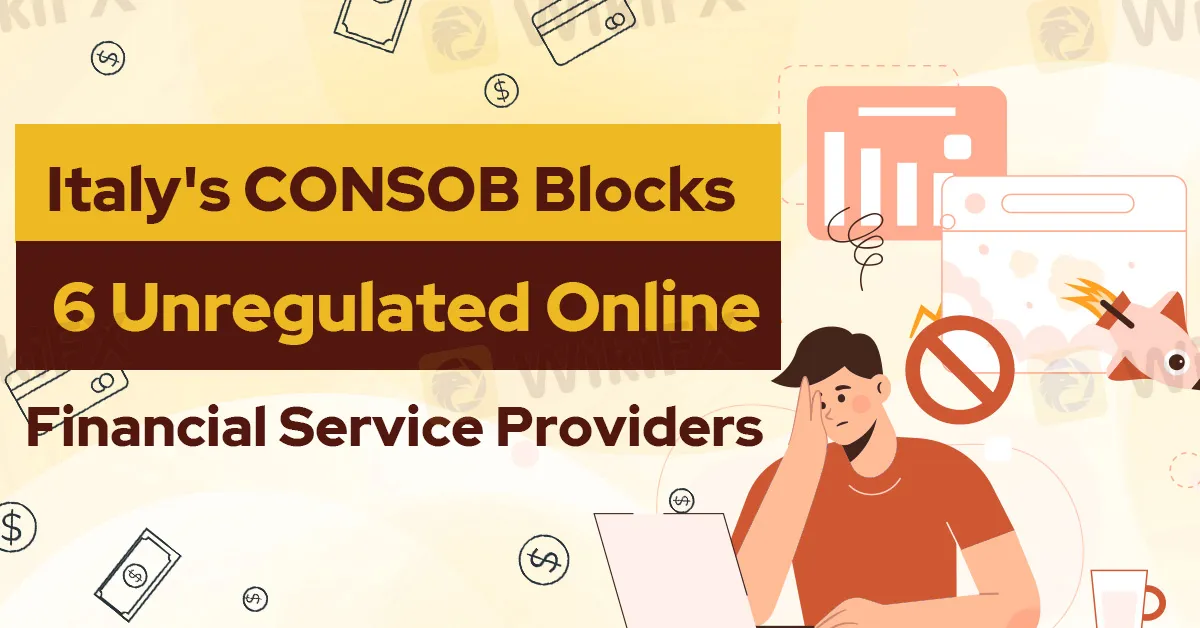简体中文
繁體中文
English
Pусский
日本語
ภาษาไทย
Tiếng Việt
Bahasa Indonesia
Español
हिन्दी
Filippiiniläinen
Français
Deutsch
Português
Türkçe
한국어
العربية
Italy's CONSOB Blocks 6 Unregulated Online Financial Service Providers
Abstract:Italy's financial watchdog, Consob, intensifies its crackdown on unauthorized financial service providers by blocking access to six new websites, aiming to shield Italian investors from potential fraud and risks associated with unregulated financial services.

Italy's financial regulatory authority, Consob, has taken a resolute stance against unauthorized financial service providers by blocking access to six new websites. The objective is clear: safeguarding Italian investors from potential fraud and risks associated with unregulated financial services.
Consob, the nation's Commissione Nazionale per le Società e la Borsa, has directed ISPs to block four offshore websites operating without authorization within the country. This aggressive move marks a significant step in combating unauthorized providers, part of Consob's ongoing efforts to shield retail investors from illegal financial services.
One concerning aspect flagged by Consob is the possibility for fraudsters to pose as legitimate financial services providers by registering domain names with relevant suffixes like '.bank' and '.fin'.
The crackdown extends beyond unauthorized providers, encompassing product offers from firms holding licenses in other jurisdictions. This strong regulatory action comes amidst the persistence of offshore brokers seeking online trading business in Italy.

Italian investors are cautioned against engaging with several flagged entities, including “BTX,” “Tide Technologies Group,” Fast-MNG EU Limited, “Alfacapitalinvest,” “Bitcoinup,” “UfinaCapital,” and Digital Trust CSP Fzco. These websites often employ tactics to lure inexperienced clients into trading highly leveraged products.
Consob's vigilance since July 2019, when granted authority to ban unregulated financial intermediaries' websites, has resulted in the blacklisting of a staggering 977 offshore sites.
The ultimate aim for the regulator is the eradication of unlicensed trading in Italy, fostering a secure environment for local investors. Employing a mix of AI-based algorithms, investigations, and customer reports, Consob identifies offshore operators engaging in illegal activities.
The regulatory arsenal expanded significantly when the 'Growth Decree' granted Consob extended powers. With this decree, Consob can instruct Italian ISPs to block websites in the region. However, due to technical constraints, the blackout might take several days to come into effect when websites temporarily shut down.
Consob's determined actions signal a relentless pursuit to clamp down on unlicensed trading activities, reinforcing a robust and protected landscape for Italian investors.

Disclaimer:
The views in this article only represent the author's personal views, and do not constitute investment advice on this platform. This platform does not guarantee the accuracy, completeness and timeliness of the information in the article, and will not be liable for any loss caused by the use of or reliance on the information in the article.
Read more

Top 10 Trading Indicators Every Forex Trader Should Know
Master the top 10 Forex trading indicators to analyze real-time Forex quotes, trends, and market signals. Learn strategies to boost accuracy and avoid mistakes.

WikiEXPO Global Expert Interview: Simone Martin—— Exploring Financial Regulation Change
In the midst of financial innovation and regulation, WikiGlobal, the organizer of WikiEXPO, stays abreast of industry trends and conducts a series of insightful and distinctive interviews on pivotal topics. We are delighted to have the privilege of inviting Simone Martin for an in-depth conversation this time.

MultiBank Group Wins Big at Traders Fair Hong Kong 2024
Discover how MultiBank Group, a global leader in financial derivatives, secured three prestigious awards at Traders Fair Hong Kong 2024, highlighting its innovative trading solutions and industry excellence.

CySEC Settles Compliance Case with Fxview Operator Charlgate Ltd
Discover how CySEC resolved compliance issues with Charlgate Ltd, the operator of Fxview, through a €50,000 settlement. Explore the investigation, regulatory measures, and CySEC's new website designed for improved accessibility and transparency.
WikiFX Broker
Latest News
Geopolitical Events: What They Are & Their Impact?
Volkswagen agrees deal to avoid Germany plant closures
Top 10 Trading Indicators Every Forex Trader Should Know
WikiEXPO Global Expert Interview: Simone Martin—— Exploring Financial Regulation Change
TradingView Launches Liquidity Analysis Tool DEX Screener
MultiBank Group Wins Big at Traders Fair Hong Kong 2024
'Young investors make investment decisions impulsively to keep up with current trends' FCA Reveals
Why Do You Feel Scared During Trade Execution?
CySEC Settles Compliance Case with Fxview Operator Charlgate Ltd
Malaysian Influencer Detained in Taiwan Over Alleged Role in Fraud Scheme
Currency Calculator


